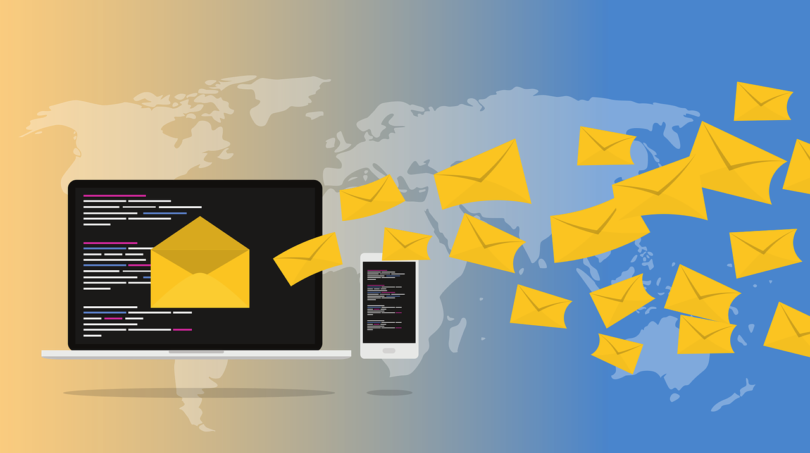Nowadays, many small businesses love to focus on new marketing techniques to communicate with their clients, from creating merch to investing in guerrilla strategies and TikTok campaigns. Regardless of how innovative these modern marketing techniques may look, small businesses should still consider tried-and-true traditional methods.
For the past ten years, email marketing has produced the greatest return on investment (ROI) among the various channels, making email one of the most effective marketing forms.
This article discusses the importance and effectiveness of email marketing in 2022, as well as some ideas and tactics for improving your small business email campaigns.
But First, What is Email Marketing?
Email marketing is the digital marketing practice of sending a commercial message to a list of ‘subscribers,’ or individuals who have given a company permission to contact them via their email address.
Email marketing keeps business customers informed, increases sales, and creates a community around a brand. Emails can be promotional or informative, and allow businesses to communicate with their customers on a one-to-one basis.
Every now and again, the stereotype that “email is dead” gets tossed around. In reality, email is growing in popularity! According to Statista, there are 4 billion DAILY email users in 2021, and it is expected to climb to 4.6 billion by 2025.
Given this statistic, it’s no surprise that email is often hailed as the most effective marketing channel. Therefore, without an effective email marketing strategy, your business is missing out on huge profits and customer relationship opportunities.
Notably, as Facebook, Apple, and Google increase their user privacy policies in 2022, email marketing will become the most critical re-marketing tool available. Let’s take a closer look at why email marketing is more important for small businesses in 2022 than ever before.
Email Marketing Can Be Used to Collect First-Party Data!
If the Apple iOS 14 upgrade or Google’s recent pledge to remove cookies taught digital marketing agencies and small businesses anything, it’s that even a minor tweak from a Big Tech firm can entirely flip marketing on its head.
The iOS 14 upgrade includes App Tracing Transparency. This mechanism requires all apps in the App Store to seek user permission before tracking their activity and behaviour. After upgrading their device, all Apple users will choose to enable or refuse monitoring when they launch an app for the first time.
Due to limited data availability, the digital marketing industry is now concerned about losing targeting tools and third-party data. As a result, the industry is unsure how efficient social media advertising will be, particularly Facebook.
Of course, there are ways to get around the iOS update in terms of Facebook advertising, such as using automated AI optimisation tools and conversion data. But, in any case, small businesses can avoid all these uncertainties by using email marketing to build their OWN list of leads and customers!
In more technical terms, when a business compiles an email subscriber list, they are collecting first-party data. First-party data is consumer information obtained exclusively from the site a person is directly accessing. These email subscribers become the company’s private client database.
As third-party cookies become less prevalent on the internet, small businesses must focus on their first-party data strategy to develop new leads and stay connected with loyal customers. Collecting information about customers with their consent will be the key to unlocking information about your audience and continuing to grow your business with a solid first-party data strategy.
Therefore, small businesses must launch entertaining, valuable, and engaging EDM (Electronic Direct Mail) campaigns to help expand this relationship and boost customer retention. Here are a few tips to help boost your email marketing campaigns in 2022.
4 Email Marketing Tips to Optimise Your Campaigns!
According to Bluecore, in 2021, 74% of Baby Boomers think email is the most personal channel to receive communications from brands, followed by 72% of Gen X, 64% of Millennials, and 60% of Gen Z.
The trick is to provide value with every email your business sends. So, consider these four quick tips and tricks to ensure successful campaigns.
1. Define and Cater to Your Target Audience
No matter what your business sells, the key to delivering successful emails is to clearly understand your audience. To effectively connect with your audience, learn all you can about them, including determining their demographics and what they are interested in.
Consider your company from a customer’s perspective: what do they require and desire? Some common examples of what typically engages customers are product tutorials, interactive material, FAQs, and product recommendations.
2. Attract Users with an Intriguing Email Subject Line
In an age where inboxes are overflowing, you need to make sure your email grabs their attention immediately.
Keep in mind the subject line is just as essential as the body of the email. Asking a question or piquing curiosity is a great way to start a subject line, so the recipient is more likely to open the email.
Take it a step further by using the recipient’s first name in the subject line. Creating personalised emails increases engagement with your brand.
3. Make Your Customers Feel Appreciated Through Promotional Campaigns
Customers must be at the centre of everything you do as a company, and they should be rewarded from time to time through special deals.
A great example is the birthday discount email, which according to Experian, generates 342% more sales than the second-most effective promotional email!
Particularly in the past two years, many customers have had a difficult time dealing with the pandemic. People simply want to feel good, which a company may cater to with an email of gratitude.
4. Make Sure Your Email Campaigns are Optimised for Mobile!
Even though nearly 55% of the entire internet’s traffic is generated from mobile devices, according to SuperOffice, almost 1 in 5 email campaigns are not optimised for mobile devices.
Individuals will not only disregard your emails if they are not optimised for a smaller mobile screen, but they may even consider pressing the unsubscribe button.
People read their emails while driving, standing in lines, and even while bathing. As a result, your marketing campaign should adapt to the increasing mobile usage trend.
What is the Best Email Marketing Software for Small Businesses in 2021?
Marketing automation software is critical for small businesses to successfully launch email campaigns as it automates every step of the process. From sending promotional emails, to managing email lists and tracking engagements, to creating complex email campaigns, they’ve got you covered.
For small businesses, MailChimp is an outstanding all-in-one and simple-to-use email marketing automation tool. MailChimp allows businesses to send bulk emails, efficiently target new clients and leads, and easily connect with WordPress.
Small businesses should also be ready to invest some of their advertising budget into hiring a Digital Marketing Agency to assist in the development of their marketing campaigns.
Email marketing will be more important than ever in 2022. Is your small business prepared?







